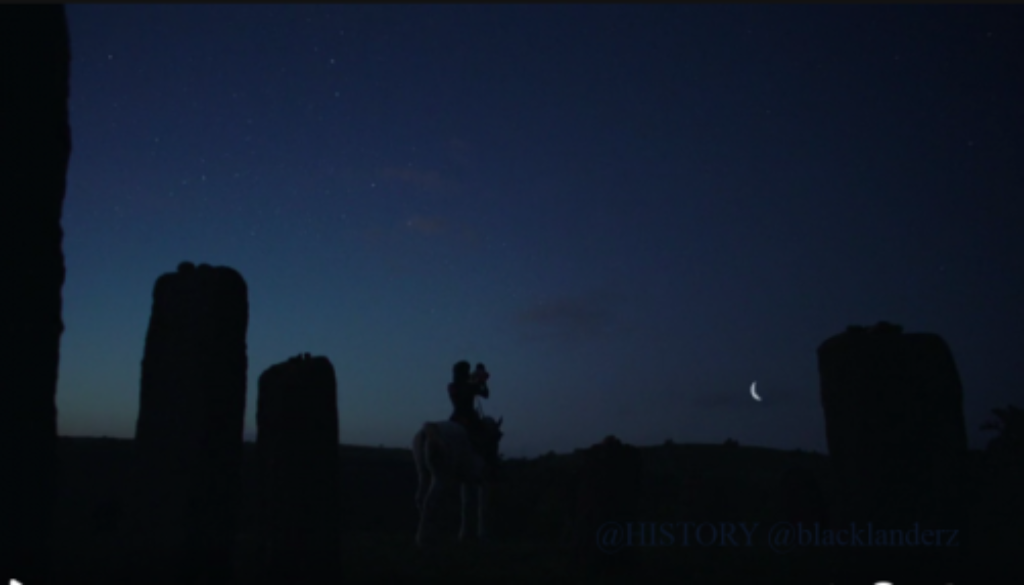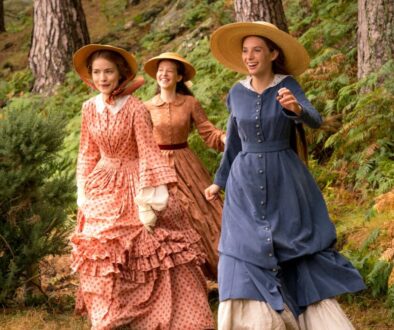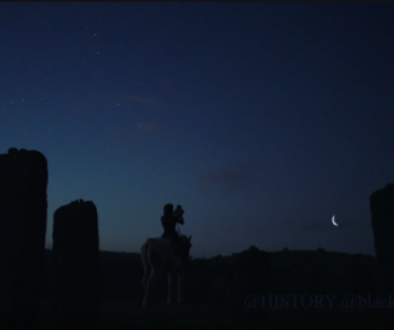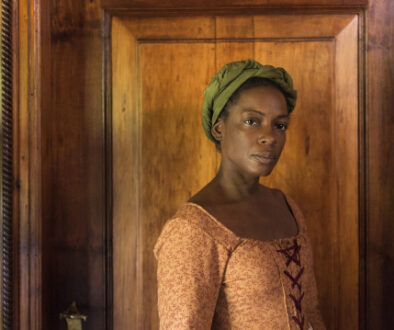A Millennial’s View – New Roots Miniseries: Part 2
This review was published on Blacklanderz.com on June 3, 2016. Part 1 can be found here. The site/social media community is aimed at bringing together black fans of Outlander and other period television dramas not usually targeted at minority audiences. Click the link for additional photos.)

Epis 3 & 4 of Roots follows Kunta Kinte’s family tree, shifting the focus to his grandchildren and great-grandchildren. Both episodes continue the precedent set in the first half of the series (Pt. 1 review) for excellent acting, powerful visual storytelling, and keeping the most important parts of Alex Haley’s work intact.
Epi3 starts with the events after Kizzy (Anika Noni Rose) gives birth to George (Regé-Jean Page). Tom Lea (Jonathan Rhys Myers) continually rapes her, but she finds a way to keep herself from getting pregnant again. She tells George all the stories about his grandpa, the Mandinka warrior, while avoiding skillfully questions about his father’s identity. Lea has a small farm with a few slaves. His main source of income is from the winnings from cockfighting matches. Mingo (Chad L. Coleman) is an older slave who has devoted his life to bird breeding. Little George is naturally curious about the birds and Mingo reluctantly takes him on as an assistant.
The nickname “Chicken George” sticks to him because of his animal husbandry skills. He’s a larger than life showman and storyteller. He’s never without his derby hat and hand-me-down jackets. Despite his talents, he is never considered equal to the white cockfighters. More of the bird management falls on Chicken George as Mingo advances in age.
After a few years later, Chicken George falls in love with Matilda (Erica Tazel), the daughter of a reverend. Kizzy is initially skeptical of Matilda and her father because she inherited Kunta’s distrust of white Christianity. Later, as the families get to know one another, Chicken George marries Matilda and they have several children. Kizzy often watches the grandkids while Chicken George is away with Lea and the birds. Matilda’s faith becomes very important later on because it falls on her to hold the family together.
During one particular trip, Chicken George meets a free man, Marcellus (Michael James Shaw). He encourages Chicken George to stop spending money on frivolous things and to save up enough money to buy freedom for himself and his family. The irony of freedom during this time period is that he still has to cater to the whims of whites in terms of where he can go and his associations. Later on, Lea is enraged when he ends up developing a romantic relationship with Kizzy. When Marcellus is forced to move on from the area, he offers Kizzy a chance to go with him. Kizzy turns him down so she can watch over Matilda and the grandkids.
This entire plotline was invented by the show, but I believe it works for two key reasons. First of all, it shows Chicken George’s transition from a carefree young man to a mature father thinking about the future. Second, it gives Kizzy a greater role in the narrative. Although she was heartbroken by Marcellus’ departure, Kizzy enjoyed true love and a consensual relationship, even if it was only for a shot time.
As time moves on, Tom Lea becomes increasingly erratic in his behavior. He harbors deep resentment for the southern gentry who look down upon his Irish heritage. In another major departure from the book, Lea forces George to fight as his second in a duel with a wealthy gentleman who insulted his heritage and is in support for Andrew Jackson. Lea refuses to call of the deal despite having a bullet through his hand and another in his midsection. He ends up having the last word as he kills the gentleman. The duel is used to teach viewers about the Jacksonian Era in the late 1820’s/early 1830’s. Poor Southern whites and middle class whites believed candidate Andrew Jackson (later President) was on their side against the large landowners and abolitionists. Jackson and his supporters were incredibly racist, as evidenced by Indian Removal and expansion of slavery into western territories.
Epi3 ends in heartbreak. Tom Lea and Chicken George attend a large cockfighting event where a very wealthy Englishman is betting large sums of money. Lea shows George his freedom papers as a reward for winning a $10,000 fight against the Englishman. They win the money, but Chicken George celebrates too soon. The Englishman isn’t satisfied and Lea doubles the previous bet to $20,000. He brings out a particularly lethal cock, which kills Chicken George’s bird in a few turns. In order to settle without declaring bankruptcy, Lea sells Chicken George’s training skills to the Englishman. The freedom papers were never registered with the court, which means he is forced to go to England. Even though I knew this was going to happen, I still couldn’t help but feel sad that he didn’t get the chance to say goodbye to his family.
Chicken George is shown at the beginning of Epi4 using his penchant for exaggeration to survive being thousands of miles from home. He spends 20 years waiting for his freedom to be granted. When he returns back to North Carolina, he finds out from a very decrepit Lea that his family was also sold in order to pay off the rest of his bills. He also finds out Kizzy died a few years before of complications from stomach pains.
He travels to the plantation of Benjamin Murray (Wayne Peré) in order to find Matilda and his children. This part of the story contains several additions to the narrative of the novel in order to fill in events that occur off to the side of the main narrative and to teach little-known Civil War history. In the book, the Murray family had no experience with farming so they treated Matilda and her children well. In the series, the Murray family is even worse than Lea. Murray’s son Frederick (Lane Garrison) is especially cruel. He forces Chicken George to wait several hours before he can reunite with Matilda.
The youngest son, Tom (Sedale Threatt Jr.), has replaced Chicken George as the head of the family. He is a master blacksmith that Frederick has hired out to the Confederate Army and others. Tom is the most resentful about Chicken George’s years away because all he has heard about his dad is the gambling and frivolous behavior. The family reunion is very short-lived because the Murrays realize they can have Chicken George arrested for being a free black man living in the same place for more than 90 days. As not to be recaptured and enslaved, he leaves for the Union Army lines, promising Matilda and the children that one day they will all be free together.
After Chicken George leaves again, the story shifts to show how his family is coping with life during the war. Some of these details were made up by the series to make Chicken George’s family more involved in the war then they were in the book. Tom is under considerable pressure from Frederick’s fiancée Nancy Holt (Anna Paquin) to use his skills to sabotage the Confederate war effort. She is a Union spy who takes advantage of the fact that the plantation becomes a Confederate Army camping ground. Tom finally agrees after being forced to watch white men rape his wife, Irene. (Carlacia Grant). He works with a free man named Jerusalem (Mekhi Phifer) to intercept Confederate intelligence. Unfortunately, Jerusalem and Nancy are caught and Frederick lynches them, while Tom manages to escape detection. This sequence of events was much more intense than I expected without being too over the top.
The focus shifts to Chicken George in the Union Army. Just as the British used Black soldiers as battering rams in Epi 2, the Union Army did somewhat the same in not given the soldiers guns. He befriends a runaway slave, Cyrus (Tip “T.I.” Harris), and they fight the Confederates together. At the Battle of Fort Pillow in Tennessee, Chicken George and Cyrus man the cannons until the Union Army surrenders. At the surrender, the Confederates purposely shoot every single Black soldier on sight. I never knew about this battle before watching Roots. I was simultaneously fascinated by the history of the battle and disgusted by the atrocity.
After the end of the war, it took another two years for Tom to find Chicken George near the Tennessee border. While Tom and the family were putting up with the unfair deal of sharecropping, Chicken George was defending free Blacks against reactionary white militias, Bushwhackers. They return to North Carolina and the family is reunited and can now live together. They decide to leave the Murray Plantation and farm their own land in Tennessee. The final shot of the series shows Tom holding his first daughter born in freedom up to the sky just like Kunta Kinte did over 100 years ago.
Laurence Fishburne, essentially the narrator of the story, appears as Alex Haley at the very end to remind the audience that the Roots saga is American history, not just Black history.
Then, the series provides an incredibly powerful montage of Alex Haley’s past, his ancestors.
No matter where we come from, knowing our family past is incredibly important – a message this Millennial cannot ignore. It may be too soon to predict the lasting impact of this miniseries. However for me, this is the best period drama miniseries I’ve seen thus far this year.



